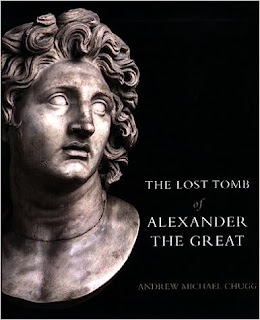Chugg has done a lot of research, not only among the writers from antiquity but also from the times of Christian and Islamic occupation in Alexandria, and from the days of French and English explorations and digs.
He starts picking up the trail of Alexander’s body to Egypt and his entombment in Memphis, followed by the transfer to Alexandria. Then he tries to figure out the layout of old Alexandria, including the harbor, the Pharos (lighthouse), the Library, and evidently the Royal Palace, including the Soma where Alexander's body was deposed. Follows a list of all those who have seen Alexander the Great, including Julius Caesar, of course, or those who have written about these visits. With the rise of Christianity and later Islam, facts become vaguer, and most recordings are ‘hearsay’. He keeps looking for the remains of the Royal Palace and the Soma and those of Alexander’s Tomb and his body throughout the centuries.
The book is stuffed with pictures, drawings, and maps, allowing you to follow his explanations and to make up your own mind, which I like. Most interesting is the overlaid map of Mahmoud Bey el-Falaki, who thoroughly investigated Alexandria in 1865-66, looking for whatever remains he could find.
The conclusion of Andrew Michael Chugg is that Alexander’s body may very well have survived all the odds and that we should look for it … in Venice, Italy. I’ll tell you no more. Find out for yourself and follow this author's argumentation step by step.
It reads like a thriller, no less.

No comments:
Post a Comment